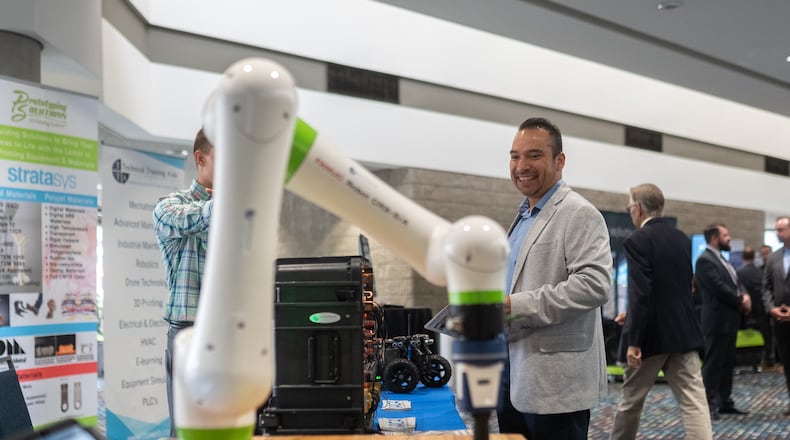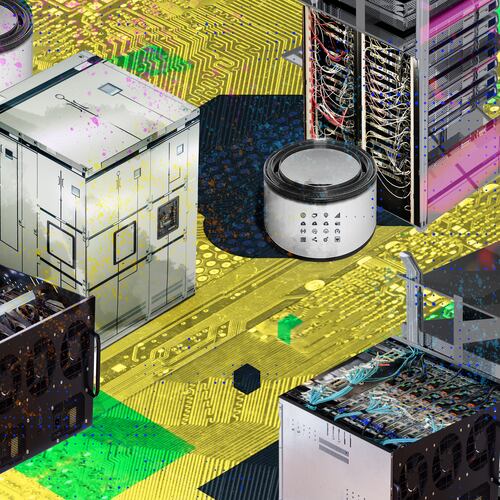Gov. Brian Kemp at a Friday workforce summit touted Georgia’s streak of large manufacturing announcements, adding that the state’s next challenge is preparing a workforce to fill the thousands of tech-focused jobs on the horizon.
The second-term Republican governor told a packed ballroom at the Georgia World Congress Center that Georgia was named the top state for business for an 11th consecutive year by Area Development Magazine. Kemp also highlighted how most of the past year’s corporate recruitment — about 83% — landed outside of the 10-county Atlanta area.
Kemp credited business-friendly policies with the achievement, adding that the state’s workforce will have to meet the demands of the coming wave of high-tech jobs.
“Right now, there are roughly three job openings in our state for every person looking for one,” Kemp said. “And we know there are significant workforce gaps in critical areas like health care and logistics.”
Georgia’s unemployment rate of 3.4% is near historic lows, although it has slightly increased in recent months amid nationwide fears of a potential recession. The state continues to add jobs, but that’s also at a slowing rate compared to the past few years’ rapid growth rate.
The e-mobility and clean tech sectors continue to be the centerpiece of Georgia’s economic development agenda. The state has landed two multibillion electric vehicle factories, dozens of suppliers and facilities across the battery supply chain.
Earlier this year, Korean automaker Kia completed a more than $200 million expansion to its West Point factory to incorporate EV production. Stuart Countess, Kia Georgia’s president and CEO, spoke Friday about how these are not your grandfather’s auto manufacturing jobs.
“There’s a term out there about four Ds: dull, dirty, dangerous and a dead-end job,” Countess said of auto manufacturing. “And I think when you look at the companies that have located in Georgia for (Kemp’s) efforts, those opportunities are not reflective of that type of statement.”
Credit: Ben Hendren
Credit: Ben Hendren
Clean tech industries, such as EVs and solar panels, have received large incentive packages from state and local leaders to come to Georgia. Federal efforts, such as President Joe Biden’s Inflation Reduction Act, have also pumped billions of dollars into those industries.
Kemp has repeatedly attacked those federal incentives as picking winners and losers, arguing that they artificially force companies to accelerate their electrification plans ahead of consumer demand.
“We are not trying to push an industry. We are trying to support companies’ missions and building products that they believe their customers are going to buy,” Kemp said, “versus mandating things that have been done at the national level.”
Kemp said the state’s focus needs to be on getting high schoolers interested in pursuing this new wave of blue-collar work. A new program called Georgia Match sent more than 132,000 letters to high school seniors last fall to highlight technical college programs.
Credit: Ben Hendren
Credit: Ben Hendren
Kemp said more than half those students submitted an application to a Georgia higher education institution, with technical college applications increasing 26% year-over-year and other public college applications increasing 10% year-over-year. He touted that a half-dozen Georgia Southern engineering students have already been hired by Hyundai Motor Group as part of its $7.6 billion Metaplant in Bryan County, which has begun producing test vehicles.
Pat Wilson, the state’s top economic development official, recently told The Atlanta Journal-Constitution that clean tech recruitment holds transformative potential for rural Georgia by allowing homegrown workers to remain in their communities.
“The companies get the benefit of the skills that we’re producing,” Wilson said. “At the same time, Georgians have the benefit of a job that’s going to be here for the next 50 years.”
About the Author
Keep Reading
The Latest
Featured





